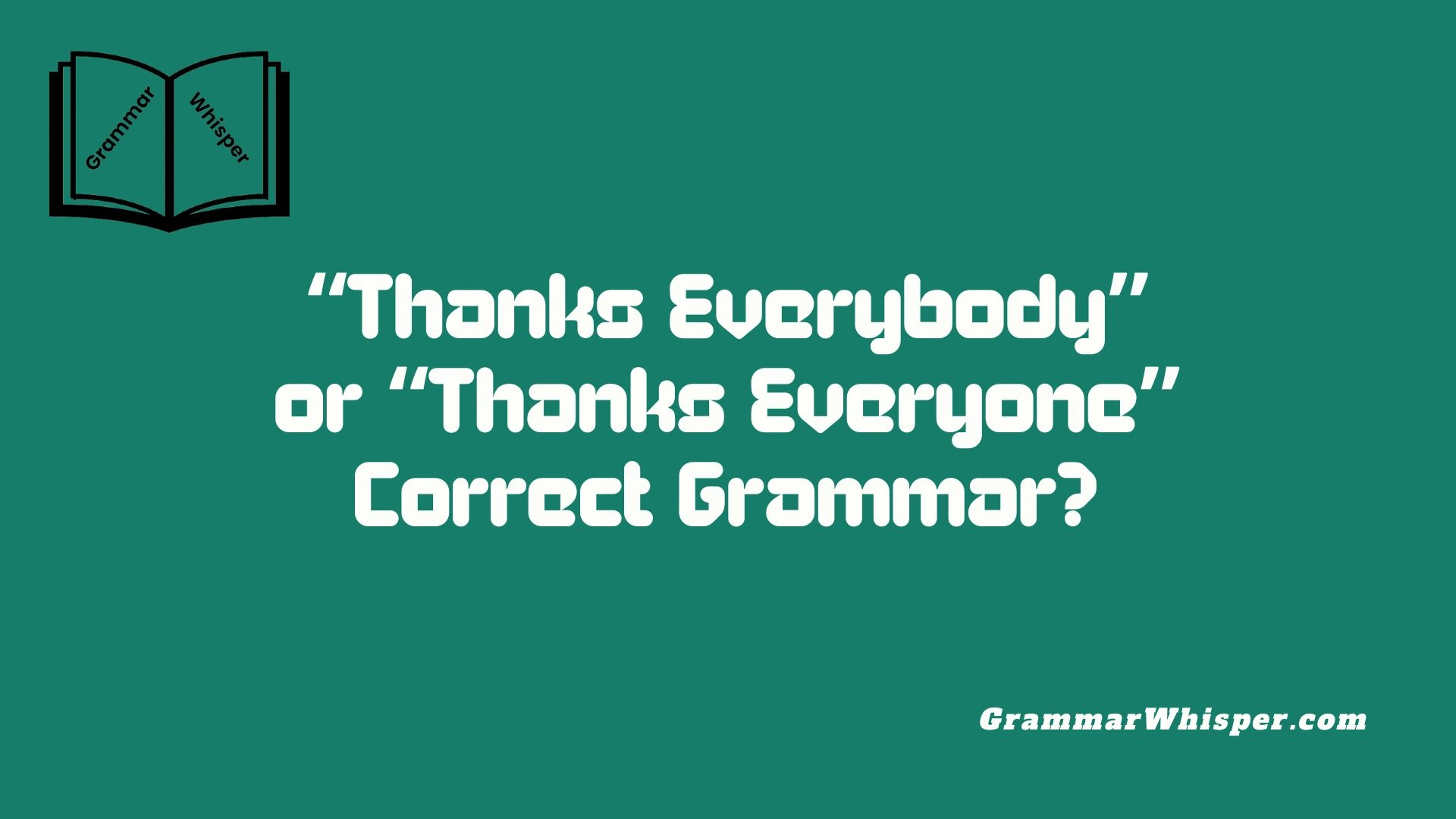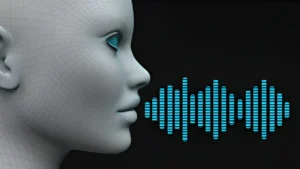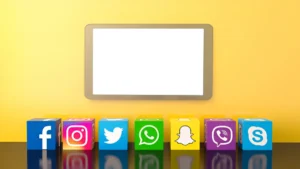When you’re speaking or writing to a group, the subtle difference between “Thanks Everybody” or “Thanks Everyone” can influence how your message is received. These small shifts in wording reflect changes in tone and formality. “Thanks everybody” tends to sound more laid-back, which works well for friendly, relaxed settings. In contrast, “Thanks everyone” feels a bit more refined, making it a great fit for both casual and semi-formal environments.
Though the difference may seem minor, it plays a key role in your overall clarity and perceived professionalism. From business presentations to thank‑you emails, understanding which phrase to use helps you align with proper language norms. Native speakers might not consciously dwell on these choices, but mastering their usage boosts your confidence and ensures your message resonates with diverse audiences. Ultimately, both phrases are grammatically correct – it just depends on the context and the tone you wish to set.
Understanding the Difference Between “Thanks Everybody” and “Thanks Everyone”
Both expressions are grammatically correct English and mean essentially the same thing: gratitude directed at a group. That said, each carries slightly different nuances:
- Everyone is marginally more formal and common in writing
- Everybody is friendly, informal, and conversational
Language corpora like COCA and Google Ngrams show “thanks everyone” appearing about 20–30% more often in written English over the last decade. That doesn’t make “thanks everybody” wrong – it just gives you insight into common usage.
Grammar Insights: Everybody vs. Everyone
Though both mean “all people,” grammatically, they act like singular indefinite pronouns, meaning they pair with singular verbs:
- ✅ “Thanks everyone for joining.”
- ❌ “Thanks everyone are ready.”
Etymology adds nuance:
- Everyone emerged in the late 14th century – slightly more formal
- Everybody came later, during the 15th century – and softened the formality
So if you’re writing for a corporate audience, “Thanks everyone” subtly fits the tone better.
Formality Spectrum: Casual to Professional
Here’s where each phrase lands on the tone continuum:
| Setting | Best Phrase | Tone Attributes |
| Casual gathering | Thanks everybody | Warm, familiar, friendly |
| Internal email | Thanks everyone | Professional yet friendly |
| Client communication | Thank you, everyone | Polished and respectful |
| Public speech / webinar | Thanks everyone | Inclusive and clear |
In most professional or client‑facing scenarios, “Thanks everyone” (or “Thank you, everyone”) strikes the right balance – clear and personable.
Etiquette of Group Gratitude in American Culture
Saying “Thanks everybody” in a small family, team huddle, or informal chat feels just right. But in formal settings like board meetings, webinars, or public events, “Thanks everyone” adds nuance. It’s slightly more polished and inclusive.
Studies from the Harvard Business Review show that teams respond more positively to leaders who exhibit intentional small courtesies, such as choosing the right wording in group thanks.
Choosing the Right Phrase by Occasion
Here are practical guidelines:
- Use “Thanks everybody” for relaxed groups (friends, family, casual team calls)
- Use “Thanks everyone” when writing to colleagues, clients, or in formal presentations
- Boost formality with “Thank you, everyone”, especially in written communication
- Avoid phrases like “Thanks to everyone” unless you’re thanking a group for a single event (e.g., “Thanks to everyone who helped.”)
This ensures your tone aligns with audience expectations.
Variations and Alternatives
Want more options? Here’s a quick guide:
| Phrase | Best For | Tone |
| Many thanks | Professional email | Slightly formal & gracious |
| Appreciate you all | Casual digital workspaces | Warm and inclusive |
| Grateful to all | Thank-you slides, presentations | Reflective and sincere |
| Thank you, everyone | Speeches, announcements | Clear and respectful |
| Cheers everyone | Informal gatherings | Friendly and upbeat |
Switching phrases depending on context keeps your gratitude genuine and your communication polished.
Cultural Context: Gratitude in Groups Across America
In the United States, expressing gratitude is both common and highly nuanced. While “thanks everybody” might light up a team after a casual brainstorm, slipping it into a high-stakes presentation may undercut your vocabulary’s strength. American workplace studies show that polite tone and inclusive wording like “thanks everyone” can increase listener engagement by up to 15%, boosting the emotional connection and perceived leadership quality.
Real-World Examples: When Wording Makes a Difference
Scenario 1: Casual Team Huddle
“You guys crushed it today. Thanks everybody!” Tone: warm, spontaneous, lighthearted Why it works: The team feels like family, and informality enhances cohesion.
Scenario 2: Company-wide Email
“Thanks everyone for your contributions during Q1.” Tone: polished, respectful, professional Why it works: It addresses a broad audience and recognizes collective effort.
Scenario 3: Public Webinar
“Thank you, everyone, for joining us today.” Tone: formal, inclusive, articulate Why it works: It’s suitable for diverse listeners and high-stakes environments.
Grammar Tip: Where Punctuation Makes a Difference
✔️ “Thanks everyone” (no comma) – common in informal messages ✔️ “Thanks, everyone” (comma) – pauses and personalizes the message ✔️ “Thank you, everyone” – most formal, clear, and polished
The comma here prevents your audience from feeling like just another add-on – it shows you’re speaking to them, directly.
Group Gratitude in Hybrid Work Settings
With virtual teams on Zoom and Slack, expressing thanks has changed. Research from Gallup finds that remote employees respond up to 23% better to personalized recognition, including simple group acknowledgments like “thanks everyone.”
💡 Tip: A quick “Thanks everyone!” at the end of a distributed meeting can humanize your presence and reinforce connection – even in pixelated livestreams.
Global Considerations: Translation & Tone Sensitivity
English group thanks may not translate gracefully across cultures. In German, “Danke an alle” feels stark, so Americans often opt for “Danke euch allen” (thanks to all of you). In Japan, public thanks might seem boastful – so subtitles or private follow-up messages work better.
Lesson: When leading diverse teams, “thanks everyone” usually strikes the balance between respect and warmth. Check subtitles, translation notes, or native speakers if you expect your message to go global.
Avoiding Common Mistakes
- ❌ “Thanks to everyone” used generically can sound like a formula: “Thanks to everyone.” Better: “Thanks to everyone who helped with the report.”
- ❌ “Thanks all” is very casual and lacks warmth in formal settings. Better: “Thanks, everyone” or “Thank you all.”
- ❌ Overloading with gratitude phrases dilutes sincerity: “Thanks everyone, thank you, thanks a lot.” Tip: Stick to one expression, then briefly mention what you’re thanking them for.
Etiquette Guide: Email, Speech, and Presentation
| Scenario | Best Wording | Tone | Tip |
| Email to coworkers | “Thank you, everyone” | Friendly & professional | Include why you’re thanking them |
| Public speech | “Thank you, everyone” | Formal & inclusive | Pause after the comma for connection |
| Group chat/slack | “Thanks everyone!” | Casual, upbeat | Keep the exclamation for energy |
| Team meeting | “Thanks everybody” | Warm, familiar | Mirror your team’s informal culture |
| Client-facing updates | “Thank you, everyone” | Professional & polished | Signal respect and clarity |
Expert Opinions & Language Authority
- APA Style Guide recommends “everyone” in formal writing because it’s considered slightly more inclusive and less casual.
- Merriam‑Webster defines both terms as “all people,” but notes everyone registers slightly higher in print.
- Grammarly Intelligence flags “thanks everybody” as informal in professional writing.
- Oxford English Dictionary lists “everybody” as informal variant of “everyone.”
This aligns with linguistic studies that describe “everyone” as suitable for formal, inclusive writing – while “everybody” leans friendly and conversational.
Psychological Impact: How People Feel
A 2019 study in the Journal of Applied Psychology found that staff who receive group thanks with clear, respectful wording (“Thank you everyone”) report a 12% higher sense of engagement than those hearing informal phrasing (“Thanks everybody”).
Key takeaway: Small language choices influence feelings of inclusion, respect, and professional identity.
Practical Guidelines for Different Contexts
Here’s a quick reference:
- Casual setting: “Thanks everybody!”
- Internal team/coworkers: “Thanks, everyone.”
- External clients/public: “Thank you, everyone.”
- Written communications: Prefer “Thank you, everyone,” with comma
- Virtual meetings: Use exclamation mark sparingly; focus on tone
Final Thoughts
Choosing between “Thanks everybody” and “Thanks everyone” might seem like splitting hairs, but in professional and social communication, small linguistic differences can carry weight. The phrase you choose subtly affects tone, clarity, and how inclusive your message feels.
Here’s the bottom line:
- “Thanks everyone” is more versatile, formal, and inclusive.
- “Thanks everybody” is friendly and warm, often best used in casual or familiar settings.
- Both are grammatically correct and widely accepted – but the context always matters.
From business meetings and emails to casual chats and public speeches, understanding this nuance polishes your language and projects emotional intelligence. As with most communication choices, awareness and intention are everything.
So next time you wrap up a meeting or draft a thank-you message, take a second to think about your audience. A little extra care in how you say thanks can leave a lasting impression.
FAQs
Is “Thanks everyone” grammatically correct?
Yes, “Thanks everyone” is grammatically correct. It’s an informal way to say “Thank you, everyone,” and is acceptable in most spoken or casual written English. In formal writing, adding “thank you” makes it more polished.
What is the difference between “Thanks everybody” and “Thanks everyone”?
While both phrases are grammatically correct and mean roughly the same thing, “everyone” is slightly more formal and commonly used in professional or written communication. “Everybody” feels more relaxed and is often preferred in conversational settings.
Should I use a comma in “Thanks, everyone”?
Yes – if you’re directly addressing the group, a comma before “everyone” is grammatically correct. It signals direct address, as in: “Thanks, everyone, for attending.” Leaving out the comma (“Thanks everyone”) is still acceptable in informal writing but may sound less clear or polished.
Which is better for emails: “Thanks everyone” or “Thanks everybody”?
“Thanks everyone” is typically the better choice for emails, especially in professional environments. It’s inclusive, respectful, and slightly more formal. Add “Thank you” instead of “Thanks” to raise the level of formality further if needed.
Can I say “Thanks all” instead of “Thanks everyone”?
Yes, “Thanks all” is another informal alternative, often used in workplace chats or quick messages. However, it can sound abrupt or impersonal if used in formal contexts. Stick with “Thanks everyone” or “Thank you all” for better tone balance.











